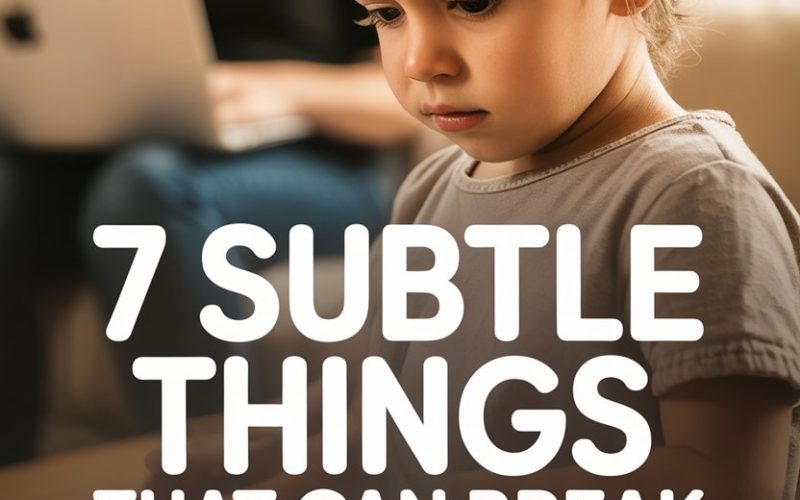Confidence isn’t something you can wrap up with a bow and hand to your child. (If only.) It’s grown, wobbles, and sometimes cracks thanks to a thousand tiny moments, most you’d never spot on a busy Tuesday.
It’s not the big, obvious stuff—at least, not most of the time. The sneaky culprits are softer, easily overlooked, and just as powerful.
Modern parenting is a juggling act, and none of us get every ball in the air. Still, a little awareness goes a long way.
Here’s what to watch out for (and a few ways to course-correct if needed).
1. Teasing About Small Mistakes
Spilling milk. Saying “aminal” instead of “animal.” Forgetting to flush. The litany of things kids get wrong on any given day could fill a novel—preferably a comedy.
Family teasing seems harmless. It keeps things light, right? But when children are ribbed too often about their little mistakes, something else seeps in.
Kids start to expect they’ll mess up. Even worse, they brace for a punchline—often at their expense.
A study on peer teasing found that constant, even well-intended, teasing can chip away at a child’s belief in themselves. The line between playful and painful is thinner than we think.
Tonight, try swapping a joke for a gentle nudge. Replace “Don’t be such a klutz, Jamie!” with “Everyone spills sometimes. Let’s clean it up together.”
It’s a tiny change, but those tiny changes stack up.
2. Overpraising Ordinary Stuff
Yes, every scribble is a masterpiece to you. Yes, your child is the next Einstein, Shakespeare, or Serena Williams—according to grandma, anyway.
But children can sniff out false praise the way they sniff out that you’ve swapped their beloved brand of fish fingers for a knock-off.
When adults throw glitter at every tiny win (“You put your shoes on! What an amazing child!”), it stops feeling special. Even worse, kids might start doubting your sincerity—or their own abilities.
Child psychologists caution that too much praise for low-effort tasks can make children anxious about bigger challenges. Suddenly, they’re not sure what’s truly praiseworthy.
Try swapping “You’re the best!” for “You worked really hard on that drawing.” Highlight effort, not just outcome. It’s an easy switch. And your child will feel seen, not just showered with confetti.
3. Interrupting Their Explanations
Time is short, and children are not known for getting to the point.
But when kids are regularly cut off—when you swoop in to finish their sentences, clarify their stories, or redirect the conversation to more “important” topics—they learn something.
Their words don’t matter as much as yours.
This habit erodes confidence quietly. Children start to second-guess their storytelling, their ideas, or their voice altogether.
Over time, they may stop volunteering thoughts at all—unless it’s a request for more screen time.
A little patience pays off (yes, even when they’re telling you about the imaginary cat who lives in their school bag). Try these magic words: “Tell me more…” Then wait.
Your kid’s confidence will thank you—even if you’re still not quite sure how the invisible cat fits into the plot.
4. Comparing Them to Siblings or Friends
“Why can’t you eat broccoli like your sister?” “Look at how neat Sam’s handwriting is.”
Intentions here are often good—motivation, a bit of healthy competition, maybe even a shortcut to world peace at the dinner table. In reality, comparisons are a well-worn shortcut to insecurity.
According to a study published in the Journal of Family Psychology, frequent comparisons can set siblings up for lifelong rivalry and self-doubt. It’s like handing out invisible scorecards, with everyone scrambling for top marks.
If you catch yourself mid-comparison, pause. Focus on their unique strengths instead: “You’re really creative with your LEGO builds. I love seeing what you invent.”
Each child deserves to be the hero of their own story, even if they do eat peas one at a time with their fingers.
5. Focusing Only on Outcomes
All parents want their kids to succeed, but modern life often rewards the gold stars and medals—the “what,” not the “how.”
When children sense that only results matter, they can get the idea that failure is something to fear or hide.
A Stanford study led by Carol Dweck found that children praised for effort and strategy, not just good grades or wins, are more willing to try new things—and less likely to crumble at setbacks.
Tonight, if your child brings you a test with a wobbly mark, skip the inquisition. Instead: “I saw how hard you studied. That’s what counts.”
The path your child walks matters more than where they land.
6. Dismissing Their Worries
“Don’t be silly, there’s nothing to be scared of.” “Monsters aren’t real, go to sleep.” “You’re fine, it’s just a little scrape.”
These responses seem practical. After all, if worrying worked, parents would be Olympic athletes.
But kids are experts at picking up emotional signals, and when their worries are brushed aside, they start to wonder if their feelings are valid.
Child development specialists agree that emotional validation builds self-worth and security. When children know they can express worries—big or small—without being shut down, confidence grows.
Try acknowledging their feelings, even if the “monster” is actually a shadow from last week’s laundry pile. “That sounds scary. Do you want to check the wardrobe together?”
You’re not promising monsters exist; you’re promising your child’s feelings do.
7. Modeling Self-Criticism
Ever muttered “I’m such an idiot” after burning the toast? Or sighed about your “mum tum” within earshot of tiny humans who think you’re perfect?
Children are expert mimics. They absorb what you say about yourself, not just what you say to them.
A steady drip of self-criticism can teach kids to be their own harshest judges.
A recent study showed that children exposed to adults’ negative self-talk were more likely to be self-critical and less likely to take risks. Not exactly the recipe for confidence.
Swap “I’m hopeless at this” for “I’m still learning, but I’ll keep trying.” Even if it’s about the infernal IKEA flat-pack. Especially if it’s about the IKEA flat-pack.
Raising Confidence, One Small Shift at a Time
Kids don’t need perfect parents. Perfection is as rare as a unicorn with a tidy bedroom.
What children really need is someone who notices the little things—someone willing to check their own habits and make tiny tweaks. Confidence grows in these moments.
Tonight, try listening an extra beat, celebrating effort, or just swapping out one self-criticism for a shrug and a smile.
You’re already doing more than you think—and if you spill the milk, well, there’s always tomorrow.




